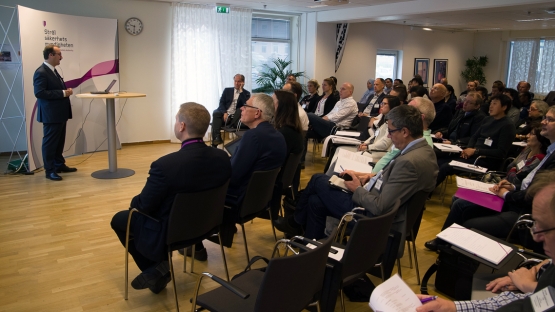Seventy-four laboratory representatives from 44 countries participated in the 14th Coordination Meeting of the IAEA's Network of Analytical Laboratories for the Measurement of Environmental Radioactivity (ALMERA) hosted by the Swedish Radiation Safety Authority (SSM) in Stockholm, Sweden. The annual meeting which took place from 23 to 25 October 2017 provided a platform for representatives of ALMERA laboratories to build upon their expertise by sharing best practices within the extensive network.
“Being a member of the ALMERA network helps laboratories develop further their capacity in environmental monitoring. The network provides an excellent possibility to exchange information at a high scientific level and gives access to resources such as inter-laboratory comparison exercises,” said Christoph Wilhelm of the Karlsruhe Institute of Technology in Germany and ALMERA Europe regional group coordinator.
From its creation in 1995, ALMERA has seen a steady increase in the number of participating laboratories and continues to address the need for accurate determination of radionuclides in environmental samples for routine and emergency monitoring.
Among the topics discussed in the meeting were plans to support the preparation of new reference materials for the upcoming years, such as seaweed, mushrooms, shrimp or anchovies. These were chosen because as commonly eaten foods, they can be important contributors to radionuclide intake and are relevant to assess radiation exposure through food consumption for the general public. The IAEA’s ALMERA network provides reference materials for radionuclides as a standard against which laboratories world-wide can measure and monitor environmental radioactivity.
Participants also discussed the development of new analytical methods, organizing training workshops and courses for the network, and the results of a recent ALMERA proficiency test, one of many which the IAEA organizes to help laboratories evaluate their analytical performance and improve the reliability of their environmental radioactivity data. The latest ALMERA proficiency test took place this year on the determination of natural and anthropogenic radionuclides in water, milk powder and NORM (Naturally Occurring Radioactive Material) samples. In addition, results of the first-ever rapid sample measurement and reporting exercise organised during the IAEA’s ConvEx-3 emergency response exercise were presented and discussed. These special samples and short-deadline reporting exercises help ALMERA laboratories improve their emergency response capabilities and their overall emergency preparedness. All these activities are key elements to ensure the quality of the measurement results Member State laboratories obtain using nuclear analytical techniques.
The ALMERA network includes regional coordinating laboratories which represent the five major areas of the world: Africa, Asia-Pacific, Europe, the Middle East and North and Latin America. Immanda Louw of the South African Nuclear Energy Corporation (NECSA) and ALMERA Africa regional group coordinator remarked that “IAEA initiatives in Africa through ALMERA and the Technical Cooperation programme strengthen regional capabilities for the measurement of environmental radioactivity. The latest project on supporting environmental radioactivity monitoring is being implemented successfully and creating various training opportunities to enhance the skills and competencies of laboratories in the region. Currently 32 out of 54 African states are participating in the project."
Besides working sessions for ALMERA’s regional groups, the meeting also included presentations by ALMERA members and discussions on topics as diverse as quality system implementation and best practices for environmental radioactivity monitoring and assessment. A technical visit of the Swedish Radiation Safety Authority laboratories took place during the meeting and was an opportunity for the participants to gain more insight into the work on radiation safety being done in Sweden. The meeting closed with the participants’ adoption of the ALMERA work plan for the upcoming years.





